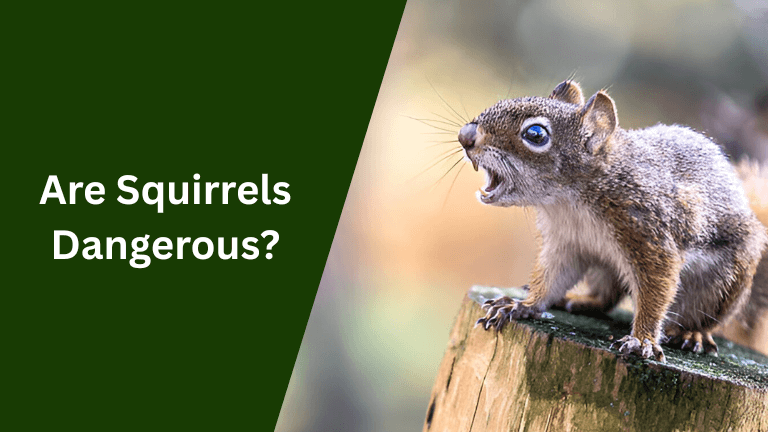Squirrels may appear harmless as they dart across parks and backyards, but their behaviors and potential to spread disease raise valid concerns. Understanding how and when squirrels can be dangerous ensures safe human-wildlife interaction.
Most squirrels are not aggressive, but they can bite or scratch if threatened or cornered. They may also carry diseases like leptospirosis, tularemia, or parasites like ticks and fleas, which can transmit illnesses to humans or pets.
While squirrels rarely pose a serious threat, this article will explore situations where they might become dangerous, diseases they can transmit, and tips for safe coexistence.
Are Squirrels Dangerous to Humans?

Squirrels are not naturally aggressive, but they can become defensive when they feel threatened. This typically occurs when:
- A human tries to feed, trap, or touch them.
- A nest or baby squirrel is approached.
- A squirrel becomes habituated to human contact due to feeding.
Possible Dangers:
- Bites and Scratches: These can introduce harmful bacteria.
- Disease Transmission: Though rare, some diseases and parasites carried by squirrels may affect humans.
- Property Damage: Squirrels can chew through wires, insulation, and wood if they enter homes.
Potential Dangers from Squirrels Are Listed Below
| Danger Type | Example | Severity |
|---|---|---|
| Physical Harm | Bite or scratch | Low–Moderate |
| Disease Transmission | Leptospirosis, tularemia | Low–Moderate |
| Parasites | Chewing on electrical wires | Moderate |
| Structural Damage | Chewing electrical wires | Moderate–High |
What Diseases Do Squirrels Carry?
Squirrels can be hosts to several zoonotic diseases that can be transferred from animals to humans. Although most cases are rare, some documented infections include:
- Leptospirosis: Bacterial infection spread through urine-contaminated surfaces or water.
- Tularemia: Caused by Francisella tularensis, it can spread through skin contact or inhalation.
- Salmonellosis: Spread through droppings.
- Ringworm: A fungal skin infection transferable by touch.
- Rabies: While uncommon in squirrels, it’s not impossible.
Note: The CDC notes that small rodents, including squirrels, are rarely infected with rabies and have not been known to transmit it to humans. Source
Are Squirrels Dangerous to Pets?
Yes, particularly to dogs and outdoor cats who may chase or try to catch them. Potential risks include:
- Injuries from bites or scratches.
- Parasite transfer, especially fleas and ticks.
- Zoonotic infections, if a pet comes into contact with urine or feces.
Always supervise pets in areas where squirrels are active and consult a vet if you suspect exposure.
How to Safely Observe or Interact with Squirrels
Squirrels are fascinating, but it’s best to appreciate them from a distance.
✅ Dos:
- Watch quietly without approaching.
- Use binoculars for close-up views.
- Feed only from designated feeders (no hand-feeding).
❌ Don’ts:
- Never try to pet or pick up a squirrel.
- Don’t leave food out near your home.
- Avoid disturbing nests.
Can Squirrels Invade Homes?
Squirrels often seek shelter in attics or crawl spaces, particularly during winter or breeding season. Once inside, they may:
- Chew through insulation and wires (fire hazard).
- Damage wooden beams or stored belongings.
- Leave behind droppings and nesting materials, increasing infection risk.
Prevention Tips:
- Seal roof and vent gaps.
- Trim tree branches near your home.
- Avoid feeding squirrels near your house.
Can squirrels attack humans without provocation?
Rarely. Most attacks are defensive, not unprovoked.
Do squirrels carry rabies?
It’s very uncommon, and there are no recorded cases of squirrels transmitting rabies to humans.
Are flying squirrels more dangerous than regular squirrels?
No. They are shy and nocturnal, with similar behaviors.
What attracts squirrels to homes?
Accessible food, shelter, and warmth attract squirrels to attics or garages.
How can you humanely remove a squirrel from your attic?
Use one-way exclusion doors or hire a licensed wildlife control professional.
Conclusion
Squirrels are not inherently dangerous, but they can become a nuisance or even a risk if they feel threatened, invade your home, or come into close contact with pets or people. Understanding their behavior, health risks, and how to safely coexist with them helps protect both you and the wildlife around you.
If you want to enjoy squirrels safely, observe from a distance and take steps to keep your home secure from uninvited guests.
